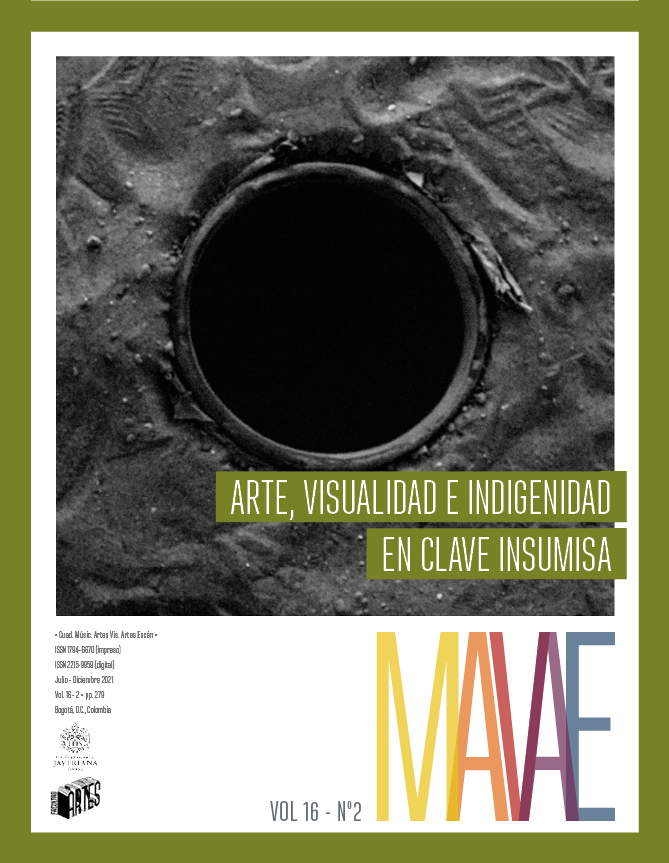Resumen
En el presente texto indago sobre la incidencia del imaginario del paraíso terrenal, propio de la tradición judeocristiana, en el proceso colonizador de América. La aseveración de un Edén en tierras americanas se decantó en la intención – acción de los colonizadores que varía constantemente según la línea ideológica desde la que estos se acercan al paraíso. En consecuencia, al tratarse de un problema propio del imaginario, se abordarán las fuentes tanto de la cultura visual como de la cultura literaria de la época buscando recrear la atmósfera de credulidad y fe en que se gestó el proceso colonizador.
Es de mi particular interés desentrañar tres consecuencias de estar siendo el paraíso que se encuentran vigentes en el territorio americano, a saber: La ideología del paisaje, la decantación de las condiciones del territorio en sus habitantes (siguiendo a Norton, 1993) y la tensión entre ser un lugar del hedonismo (abundante y abierto) y, a la vez, un lugar de la dificultad (salvaje y riesgoso). Considero que indagar las implicaciones del paraíso en el territorio americano y en sus habitantes, podría contribuir a la revisión crítica sobre la representación, conceptualización y narración que nos identifica hasta el día de hoy. Vernos tal cuál somos, continuando con la pregunta que inicia Gayatri Spivak en ¿Puede hablar el subalterno? (1988), es mi principal intención en las páginas que usted está por leer y en la investigación en curso.
Buratto Rodrigues de Mello, Glaucia. 2014. “Visions of Paradise in the New World: A Place Called Brazil”. Andamios 11, n.o 25: 293-314.
Carrasquillo, Rosa Elena. 2019. “La creación del primer paisaje colonial español en las Américas, Santo Domingo, 1492-1548”. Antípoda: Revista de Antropología y Arqueología, n.o 36: 61-84. https://doi. org/10.7440/antipoda36.2019.04.
De León Pinelo, Antonio. 1943. El paraíso en el Nuevo Mundo. Editado por Raúl Porras Barrenechea. Lima: Comité del Bicentenario del Descubrimiento del Amazonas.
Delumeau, Jean. 2014. En busca del paraíso. México: Fondo de Cultura Económica.
Dubois, Philipe. 1994. El acto fotográfico. 2.a ed. Barcelona: Paidós.
Eliade, Mircea. 1994. Nostalgia originilor: Istorie si semnificatie în religie.
Bucarest: Humanitas.
Fernández de Navarrete, Martín. 1859. Colección de los viajes y descubrimientos que hicieron por mar los españoles desde fines del siglo XV, con varios documentos inéditos concernientes a la historia de la marina castellana y de los establecimientos españoles en Indias. Vol. 2: Documentos de Colón y de las primeras poblaciones. Madrid: Imprenta Real.
Fernández de Navarrete, Martín, ed. 1922. Viajes de Cristóbal Colón: Con una carta. Madrid: Calpe.
Foucault, Michel. 1966. Las palabras y las cosas: Una arqueología de las ciencias humanas. Buenos Aires: Siglo XXI.
Genette, Gérard. 1989. Palimpsestos. Madrid: Taurus.
Gines de Sepulveda, Juan. 1941. Tratado sobre las justas causas de la
guerra contra los indios. México: Fondo de Cultura Económica. Holanda, Sergio Buarque de. 1994. Visão do paraíso: Os motivos edênicos no descobrimento e colonização do Brasil. São Paulo: Brasiliense.
Inveges, Agostino. 1649. Historia sacra paradisi terrestris et sanctissimi innocentiae status: in qua primo, paradisis terrenus: secundo, vita beatissima Adami, & Euae in horto: tertio, status faelicissimus suorum posterum, si originalis stetisset institia: quarto, tentatio, peccatum, iudicium, ac poena prothoparentum: ultimo, vita aerumnosa eorumdem, quá ab exilio usque ad dormitionem diù, & misère duxere, describitur: in hac sacra historia ex scripturis, concilijs, patribus, theologis ... brevissime exponitur. Panormi: Ex typographia Petri de Isola.
Kwiatkowski, Nicolás. 2017. “Palabra e imagen en la modernidad temprana: Representaciones de la barbarie mediante ilustración, écfrasis y alegoría”. Boletín de Estética, n.o 39: 43-94. Acceso el 1 de mayo de 2021. http://boletindeestetica.com.ar/index.php/boletin/article/view/48.
López de Gómara, Francisco. 1999. Historia General de las Indias. Alicante: Biblioteca Virtual Miguel de Cervantes. Acceso el 18 de abril de 2021. http://www.cervantesvirtual.com/obra/historia-general-de- las-indias--0/.
Merchant, Carolyn. 2003. Reinventing Eden: The fate of nature in Western culture. Nueva York: Routledge.
Mitchell, William John Thomas, ed. 1994. Landscape and Power. Chicago: University of Chicago Press.
Mitchell, William John Thomas. 1995. Picture Theory: Essays on Verbal and Visual Representation. Chicago: University of Chicago Press.
Norton, Anne. 1993. “Ruling Memory”. Political Theory 21, n.o 3: 453-463.
Pellicer, Rosa. 2009. “‘Continens Paradisi’: El Libro segundo de ‘El paraíso en el Nuevo Mundo’ de Antonio de León Pinelo”. América sin Nombre, n.o 13-14: 32-38.
Sáenz-López Pérez, Sandra. 2011. “Las primeras imágenes occidentales de los indígenas americanos: Entre la tradición medieval y los inicios de la antropología moderna”. Anales de Historia del Arte, volumen extraordinario: 463-481. http://dx.doi.org/10.5209/rev_ ANHA.2011.37472.
Salkeld, John. 1968. A Treatise of Paradise 1617. Georgia: Emory University.
Spivak, Gayatri Chakravorty. 2003. “Can the Subaltern Speak? Die Philosophin 14, n.o 27: 42-58.
Staden, Hans. 1557. Warhaftige Historia vnd beschreibung eyner Landtschafft der Wilden, Nacketen, Grimmigen Menschfresser Leuthen, in der Newenwelt America... Gedruckt zu Marpurg, Zu Marpurg im Kleeblatt, bei Andress Kolben.
Suárez, Francisco. 1740. Opera Omnia: R. P. Francisci Suarez Granatensis è Societate Jesu, ... Commentaria Ac Disputationes in Primam Partem D. Thomae De Deo Effectore Creaturarum Omnium : In Tres praecipuos Tractatus distributae, quorum Secundus De Opere Sex Dierum, Ac Tertius De Anima / R. P. Francisci Suarez; Tomus III / R. P. Francisci Suarez. Venetii: Balleoni.
Vespucio, Americo. 1942. Cuatro navegaciones de Americo Vespucio. Cartas de Vespucio. En conmemoracion del aniversario CCCCL del descubrimiento de America. Bogotá: Biblioteca Nacional.
Zacher, Julius, ed. 1859. Alexandri Magni iter ad paradisum. T. Theile.

Esta obra está bajo una licencia internacional Creative Commons Atribución 4.0.
Derechos de autor 2021 Jorge Esteban Torres


